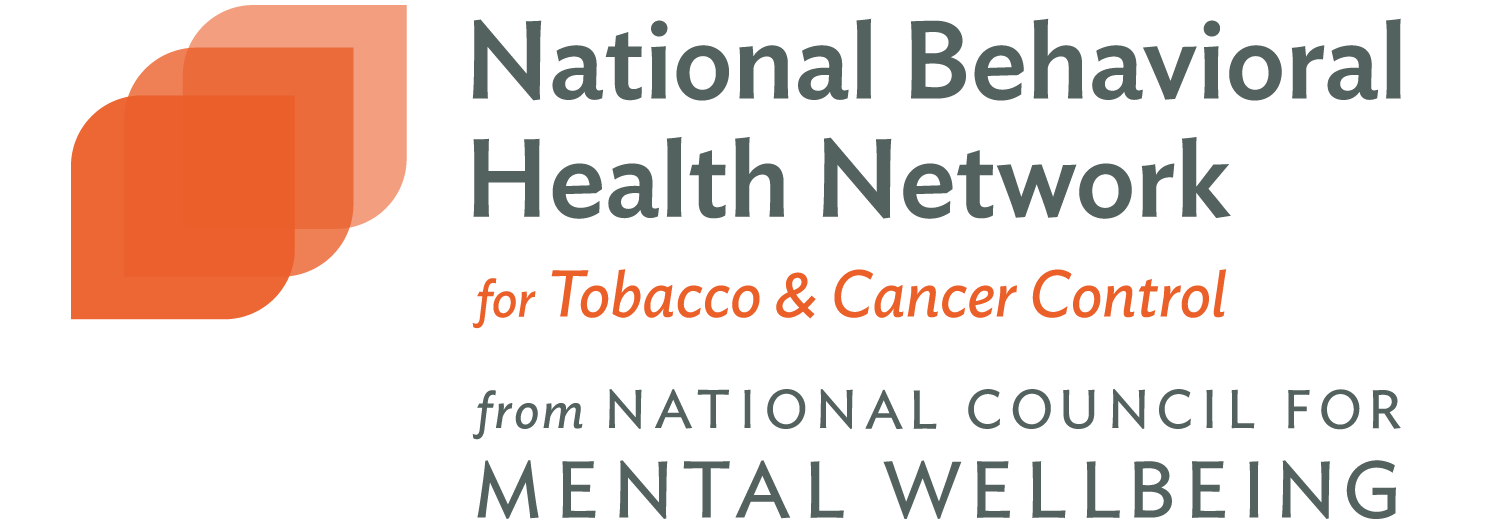In August 2019, the National Behavioral Health Network for Tobacco & Cancer Control (NBHN) facilitated the launch of the 2019 Cancer and Behavioral Health Education training, a three-part in-person and virtual cancer training series for state cancer control program teams around the intersection of cancer and behavioral health. This training and technical assistance offering was provided to five states seeking to enhance their knowledge of and capacity to address cancer-related disparities for individuals with behavioral health conditions (mental health and substance use disorders).
Due to factors such as late stage diagnosis, co-morbidities, and inadequate treatment and screenings, people with behavioral health conditions may develop cancer at a rate 2.6 times higher than the general population1. In addition, up to 50% of patients with terminal cancer have been diagnosed with at least one psychiatric disorder.2 Although some states recognize the importance of including behavioral health populations in their state cancer plans, only two state comprehensive cancer plans explicitly identify behavioral health populations as a priority for state cancer prevention and control efforts. In the face of many states refreshing their state comprehensive cancer control plans, the National Behavioral Health Network recognized the timely opportunity to offer targeted training and technical assistance related to this topic.
The 2019 Cancer & Behavioral Health Education cohort included five state comprehensive cancer control program teams and their cancer coalition counterparts who were eager to address mental health across their states and participate in an active peer learning environment during the course of the training. The five participating states included Connecticut, Oklahoma, Oregon, Washington and Wisconsin, who partnered with their respective comprehensive cancer coalition members to learn how they can collaborate to make a powerful impact for people with mental illness in their states. Training participants received direct access to a series of virtual and in-person trainings aimed at:
- Increasing state cancer control knowledge of cancer and behavioral health disparities
- Increasing knowledge of and skills to address cancer disparities within behavioral health populations
- Increasing awareness and capacity around cancer prevention, screening, and treatment with behavioral health populations
- Increasing utilization of CDC’s national public health campaigns to promote cancer prevention with behavioral health populations
- Increasing motivation, inspiration and action with state cancer control programs to make changes in addressing the needs of behavioral health populations and others to act and make changes
Cohort members from participating states engaged in two webinars and one in-person training that convened in Washington D.C. The training was facilitated by subject matter experts in the field including Taslim Van Hattum, LCSW, MPH, Director of Practice Improvement at the National Council for Behavioral Health; Tasha Moses, MPA, President at Strategic Management Services LLC; Kathleen Garrett, MA, TTS-C, Research Senior Instructor and Clinical Associate in Behavioral Health for the Behavioral Health and Wellness Program at the University of Colorado Denver; Susan Ash-Lee, LCSW, Senior Director of Clinical Services at the Cancer Support Community. Participants also had a chance to learn about groundbreaking topics such as the link between obesity and cancer, and how to infuse behavioral health into cancer survivorship programming.
The training proved to be a valuable opportunity for states to learn from each other and brainstorm new ideas to integrate into their future cancer control action plans. The National Behavioral Health Network for Tobacco and Cancer Control is honored to continue working with states to find innovative ways to prioritize people with behavioral health conditions. We congratulate these five states in taking the first steps forward!
Interested in the mental health impacts of a cancer diagnosis? Check out our blog post to learn more.
Sources:
- Weinstein L., Stefancic A., Cunningham A., Hurley K., Cabassa L., Wender R. Cancer screening, prevention, and treatment in people with mental illness. CA Cancer J Clin. 2016 March; 133-151. doi: 10.3322/caac.21134.
- Miovic M., Block S. Psychiatric Disorders in Advanced Cancer. Wiley Interscience. 2007 September. American Cancer Society. Doi 10.1002/cncr.22980.



